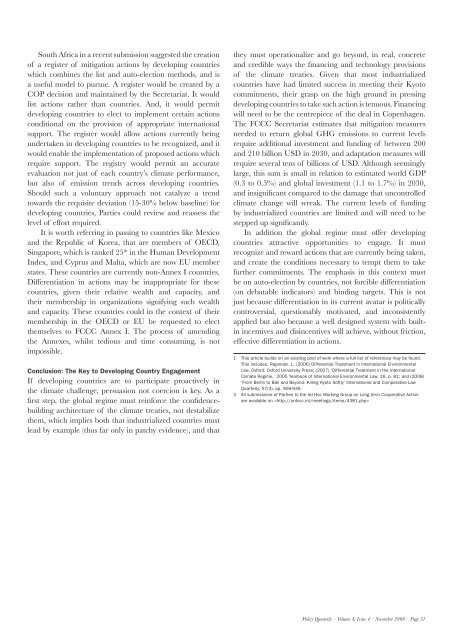Sharing the Burden of Climate Change Policy Quarterly issue with ...
Sharing the Burden of Climate Change Policy Quarterly issue with ...
Sharing the Burden of Climate Change Policy Quarterly issue with ...
You also want an ePaper? Increase the reach of your titles
YUMPU automatically turns print PDFs into web optimized ePapers that Google loves.
South Africa in a recent submission suggested <strong>the</strong> creation<br />
<strong>of</strong> a register <strong>of</strong> mitigation actions by developing countries<br />
which combines <strong>the</strong> list and auto-election methods, and is<br />
a useful model to pursue. A register would be created by a<br />
COP decision and maintained by <strong>the</strong> Secretariat. It would<br />
list actions ra<strong>the</strong>r than countries. And, it would permit<br />
developing countries to elect to implement certain actions<br />
conditional on <strong>the</strong> provision <strong>of</strong> appropriate international<br />
support. The register would allow actions currently being<br />
undertaken in developing countries to be recognized, and it<br />
would enable <strong>the</strong> implementation <strong>of</strong> proposed actions which<br />
require support. The registry would permit an accurate<br />
evaluation not just <strong>of</strong> each country’s climate performance,<br />
but also <strong>of</strong> emission trends across developing countries.<br />
Should such a voluntary approach not catalyze a trend<br />
towards <strong>the</strong> requisite deviation (15-30% below baseline) for<br />
developing countries, Parties could review and reassess <strong>the</strong><br />
level <strong>of</strong> effort required.<br />
It is worth referring in passing to countries like Mexico<br />
and <strong>the</strong> Republic <strong>of</strong> Korea, that are members <strong>of</strong> OECD,<br />
Singapore, which is ranked 25 th in <strong>the</strong> Human Development<br />
Index, and Cyprus and Malta, which are now EU member<br />
states. These countries are currently non-Annex I countries.<br />
Differentiation in actions may be inappropriate for <strong>the</strong>se<br />
countries, given <strong>the</strong>ir relative wealth and capacity, and<br />
<strong>the</strong>ir membership in organizations signifying such wealth<br />
and capacity. These countries could in <strong>the</strong> context <strong>of</strong> <strong>the</strong>ir<br />
membership in <strong>the</strong> OECD or EU be requested to elect<br />
<strong>the</strong>mselves to FCCC Annex I. The process <strong>of</strong> amending<br />
<strong>the</strong> Annexes, whilst tedious and time consuming, is not<br />
impossible.<br />
Conclusion: The Key to Developing Country Engagement<br />
If developing countries are to participate proactively in<br />
<strong>the</strong> climate challenge, persuasion not coercion is key. As a<br />
first step, <strong>the</strong> global regime must reinforce <strong>the</strong> confidencebuilding<br />
architecture <strong>of</strong> <strong>the</strong> climate treaties, not destabilize<br />
<strong>the</strong>m, which implies both that industrialized countries must<br />
lead by example (thus far only in patchy evidence), and that<br />
<strong>the</strong>y must operationalize and go beyond, in real, concrete<br />
and credible ways <strong>the</strong> financing and technology provisions<br />
<strong>of</strong> <strong>the</strong> climate treaties. Given that most industrialized<br />
countries have had limited success in meeting <strong>the</strong>ir Kyoto<br />
commitments, <strong>the</strong>ir grasp on <strong>the</strong> high ground in pressing<br />
developing countries to take such action is tenuous. Financing<br />
will need to be <strong>the</strong> centrepiece <strong>of</strong> <strong>the</strong> deal in Copenhagen.<br />
The FCCC Secretariat estimates that mitigation measures<br />
needed to return global GHG emissions to current levels<br />
require additional investment and funding <strong>of</strong> between 200<br />
and 210 billion USD in 2030, and adaptation measures will<br />
require several tens <strong>of</strong> billions <strong>of</strong> USD. Although seemingly<br />
large, this sum is small in relation to estimated world GDP<br />
(0.3 to 0.5%) and global investment (1.1 to 1.7%) in 2030,<br />
and insignificant compared to <strong>the</strong> damage that uncontrolled<br />
climate change will wreak. The current levels <strong>of</strong> funding<br />
by industrialized countries are limited and will need to be<br />
stepped up significantly.<br />
In addition <strong>the</strong> global regime must <strong>of</strong>fer developing<br />
countries attractive opportunities to engage. It must<br />
recognize and reward actions that are currently being taken,<br />
and create <strong>the</strong> conditions necessary to tempt <strong>the</strong>m to take<br />
fur<strong>the</strong>r commitments. The emphasis in this context must<br />
be on auto-election by countries, not forcible differentiation<br />
(on debatable indicators) and binding targets. This is not<br />
just because differentiation in its current avatar is politically<br />
controversial, questionably motivated, and inconsistently<br />
applied but also because a well designed system <strong>with</strong> builtin<br />
incentives and disincentives will achieve, <strong>with</strong>out friction,<br />
effective differentiation in actions.<br />
1 This article builds on an existing pool <strong>of</strong> work where a full list <strong>of</strong> references may be found.<br />
This includes, Rajamani, L. (2006) Differential Treatment in International Environmental<br />
Law, Oxford: Oxford University Press; (2007) ‘Differential Treatment in <strong>the</strong> International<br />
<strong>Climate</strong> Regime,’ 2005 Yearbook <strong>of</strong> International Environmental Law, 16, p. 81; and (2008)<br />
‘From Berlin to Bali and Beyond: Killing Kyoto S<strong>of</strong>tly’ International and Comparative Law<br />
<strong>Quarterly</strong>, 57(3), pp. 909-939.<br />
2 All submissions <strong>of</strong> Parties to <strong>the</strong> Ad Hoc Working Group on Long term Cooperative Action<br />
are available on <br />
<strong>Policy</strong> <strong>Quarterly</strong> – Volume 4, Issue 4 – November 2008 – Page 51
















